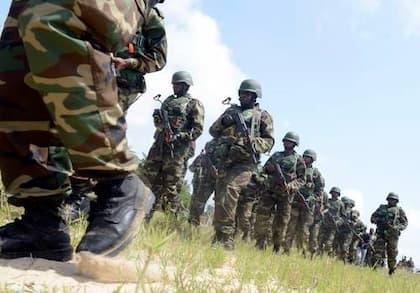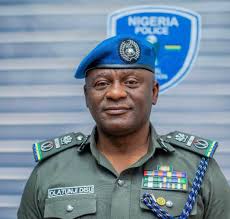President Muhammadu Buhari feels that the security agencies are not doing enough despite what has been provided.
Buhari, according to the National Security Adviser, Babagana Monguno, expressed the feeling on Thursday during the National Security Council meeting held at the State House, Abuja.
He said the president expressed sadness over the recent killings and the abductions of some Nigerians by criminals and bandits.
Addressing reporters after the meeting, Monguno said Buhari was sad because of the ceaseless attacks which the security agencies had been unable to end.
He cited the recent attack on the Abuja-Kaduna train which left some passengers dead and others kidnapped.
Monguno said Buhari alone could not completely receive the blame for the insecurity in the country as his part was to make strategic decisions which he was currently doing.
He said the president directed all heads of security establishments to secure the release of all abductees across the country.
He said Buhari also ordered all operational and intelligence elements to immediately rescue all captives unhurt, including those kidnapped by terrorists in the Kaduna train attack last month.
Monguno said Buhari was looking into a memo he submitted containing wide ranging recommendations on the level of security at land borders and within the country.
He said the president might call for another meeting in the near future having decided to look at the memo that dwelled on the prevailing situation within the security outfits as well as their needs and challenges.
The NSA underscored the need for human intelligence and warned that the security situation might linger beyond the timeframe it was expected to end if the society refused to provide the needed information to nip it in the bud.
Monguno said though a lot of successes had been recorded in the maritime domain, the problem had “shifted to our borders from outside.
“As a result of that, there’s a need for us to configure how we’re going to make our borders more secure because of the threats coming from outside the borders.”
He regretted that the improved stability in the North East had not brought about the situation envisaged by the government in the country as the threat had moved from the zone to the North West and the North Central, stressing that “this threat has to be contained collectively by both the Armed Forces as well as the constabulary forces: the Nigerian Police Force, Civil Defence.”
He said the intelligence agencies had also been directed to enhance the acquisition of intelligence.
“The present situation in the country calls for collective effort by all, not just those that have been charged with the responsibility of physically securing the country, the most important thing for now is acquisition of intelligence and the type of intelligence that is needed is human intelligence.
“I need to make it very clear, I’ve to be very honest; unless the wider society, right down to the local governments, are willing to give the type of information needed to block the activities of these criminals, this situation will continue to linger beyond whatever timeframe we’re looking at, towards ending this great problem.”
On why it was difficult to deploy technology, especially in some areas that the military had been having problems, he said: “One, technology is expensive. Technology takes time to acquire. Inherently, we do not produce these very, very delicate equipment.
“It’s not as if the government is not making any effort to acquire them, but we need to know who to acquire this technology from, where, when and there are certain processes. For now, I know we have, but the plight is that they’re inadequate. So, to the government, it’s a continuous process. That’s what I can say about the issue of deploying technology.”
He said the country was experiencing infiltration because of the extensive borders and the nation’s large economy that attracted a lot of people from outside who came in illegally through the land borders and the maritime waters.
Asked whether his memo included the United States Government’s approval of additional arms sales to Nigeria with $1bn, he confirmed that the deal was sorted out after his trip together with the Chief of Staff to the President, Ibrahim Gambari, to Washington with a to clarifying information sent to them by some Nigerians.
He said: “On the US government arms deal with $1bn, the president directed, the chief of staff and myself, to go to Washington and speak with the relevant authorities, and try to explain to them and defuse whatever tension that exists. Because of some of the things that have gone out from our own people. And as a result of whatever messages that have been sent across to the United States, we’ve had difficulties in working with them.
“Of course, naturally, they’ve been our allies. So, we had to make a case on behalf of the government and people of Nigeria to set the record straight. And that resulted in the offer they need to give us the equipment, because they were concerned about certain issues. So, the president directed the chief of staff and myself, we went to Washington, and we spoke with members of Congress and members in other departments. So, that’s what gave rise to this deal.”
On why the security forces had not attacked the terrorists who had launched assaults on the military base in their hideouts going by the statement credited to the governor of Kaduna State that the security agents knew the locations of the terrorists, Monguno said: “Governor Nasir El-Rufai, spoke about the security agencies saying we know who they are, where they are. Again, that is the danger. When you start talking too much, you give away a lot.
“Now, even if they say we know where they are, that in itself is already a problem. Because once you say it, whether it is true or false, the person who has your people in captivity will move to another location. It’s just as simple as that. So, sometimes is best to just keep silent, mum is the word.”
The Inspector-General of Police, Usman Alkali Baba, while reacting to a question on the massive deployment of police personnel in the South East; while Kaduna State was under-policed, said the number of police formations, divisions and zonal commands determined the decision which might be improved upon with the agents from neighbouring states.
A MUST TO READ BELOW
For your Advert Placement, Publicity, Press Release, Personality Promotion, Special Report, Featured story, Conference, Interviews, And So On – CONTACT US on WhatsApp/Call📞@ 08072633727 📲
NOTE: We wish to add you to our WhatsApp Database to get our Trending, latest and timely news directly into your WhatsApp Box as the news breaks.




